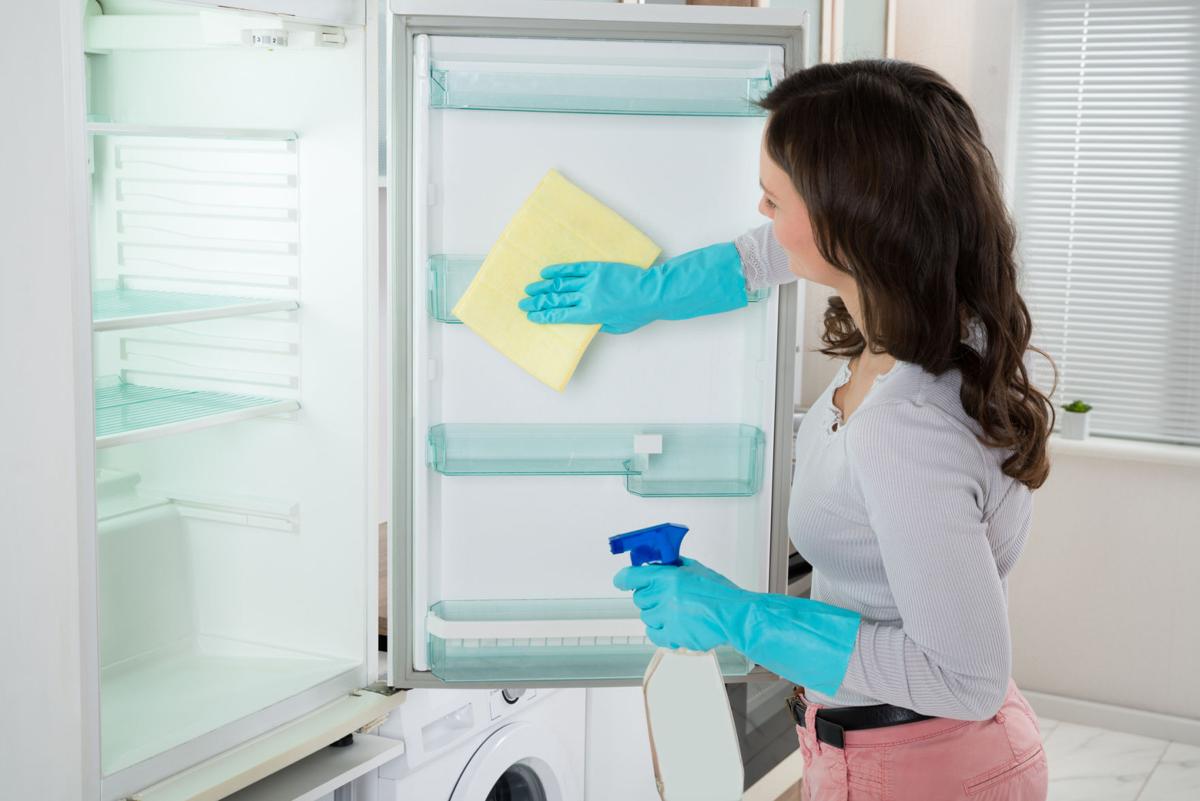Question: How often and what is the best way to clean refrigerator coils?
Answer: Condenser coils should be cleaned once a year, or twice if you have pets in the house. When dirt and dust build up on coils, it takes more electricity to keep food cold.
Move the refrigerator out from the wall. Unplug the unit. Find the location of the refrigerator’s coils by checking the owner’s manual. Sometimes they’re on the back of the appliance; sometimes they’re under a toe grill at the front of the fridge. You may have to remove a panel or grill. Gently dust the coils with a rag or brush and vacuum the coils.
While you are at it, replace the water dispenser filter and do it again in six months (unless the manufacturer says otherwise). Take all the food out of your refrigerator and wipe the surfaces of the interior with a water solution that includes baking soda or vinegar. Throw away food that’s been around too long. It is also important to keep door seals clean. Dirty seals make the door harder to open and can cause the seals to tear.
This process will help increase the efficiency of your refrigerator and help it last longer.
Q: What is Rosie’s preferred method for deep cleaning an oven?
A: It depends on how grungy the oven is. Sometimes I just use the oven’s self-cleaning cycle unless it is a hot day due to the high heat that the process generates. Remove foil, pans, and racks and wash those by hand. Wipe up loose soil in the oven. Follow instructions in the appliance’s manual to start the self-clean cycle. Ventilate the area and don’t leave the house while the cleaning cycle is on.
Commercial oven cleaners are very strong and caustic but can remove heavy dirt. It’s essential to cover the floor and nearby surfaces like cabinets, before using them. Wear rubber gloves, goggles and old clothes for this job. Ventilate the area.
Then there is the baking soda and vinegar method, which requires more elbow grease and time. Mix a couple spoonfuls of baking soda with water to create a paste to spread on walls of the empty oven. Let the oven sit 12 hours; the paste may turn brown. With a wet rag or sponge, wipe up all the paste. Sponge vinegar on surfaces where the baking soda is stuck. Use baking soda on the oven window and let it sit for 30 minutes before wiping off.
If you tidy up the oven now and then with soapy water whenever you roast or bake, the big cleaning jobs will be easier in the long run.
Q: Will cleaning the dishwasher make it run more efficiently?
A: Absolutely. Over time, grease, soap scum and food debris build up. The appliance becomes less efficient and can get a little too aromatic.
Remove the bottom dish rack and clear the drain of any debris. Then run a hot water cycle in the dishwasher with a cup of white vinegar sitting in a sturdy container on the top rack. This will wash away odors and grime. After the cycle finishes, sprinkle a handful of baking soda around the dishwasher bottom and run a short cycle using hot water. You can buy a bottle of dishwasher cleaning fluid at the grocery store. Simply put the bottle on the top rack and run a hot-water cycle in the empty dishwasher.
After a cleaning cycle, wipe the inside of the dishwasher down with a clean towel to remove any residue left behind.
Q: How do I remove the stink from my washing machine?
A: To keep your machine smelling clean and sweet, fill the tub with hot water, pour in three cups of vinegar and a half cup of baking soda and run the mixture through a complete cycle. Sponge off the agitator and tub surfaces with a water and vinegar mixture. If you have a front-load washer, use a rag with either hot soapy water or a spritz of mildew cleaner to clean the rubber door gasket. Wipe underneath and around it as well. Remember to clean the detergent and fabric softener dispensers.
Q: Do I have to pay taxes for my housekeeper?
A: According to the IRS, if household employees including housekeepers, maids, babysitters, gardeners, and others who work in or around your private residence as your employee, then yes, you do. Household workers are your employees if you can control not only the work they do, but also how they do it.
That means if you hire the housekeeper (older than 18) to come to your home, follow your instructions, requests and rules for cleaning, use your brooms and window cleaner, and she collects her fee directly from you, that housekeeper is your employee and you must pay Social Security and Medicare taxes for your employee if you pay her $2,300 or more a year in 2021.
Amy Spencer, a Tucson-based certified public accountant, clarifies that if you pay the housekeeper more than $1,000 in any calendar quarter in 2020 or 2021, you will also have to pay federal unemployment tax. You may owe state unemployment tax as well. Form W-2 must be filed for each household employee who was paid Social Security and Medicare wages of $2,300 or more, or wages of any amount if federal income tax was withheld.
Repairmen, plumbers, contractors, and other business people who provide their services as independent contractors, are not your employees and you do not pay their taxes.
The IRS doesn’t allow homeowners to classify a housekeeper — or any household employee — as an independent contractor unless the worker is incorporated, bonded, licensed in the trade and follows a bunch of corporate legalities.
If you use the services of a housekeeper — even through a service — confer with your tax accountant.





